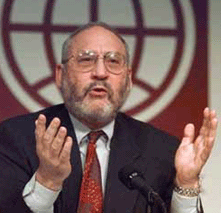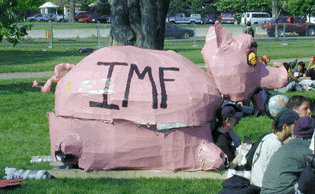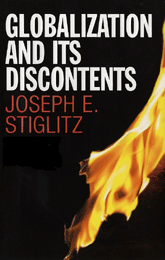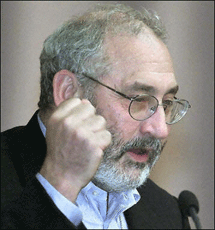
Home Mail Articles Stats/current Supplements Subscriptions Links
The following article appeared in Left Business Observer #102, September 2002. It retains its copyright and may not be reprinted or redistributed in any form - print, electronic, facsimile, anything - without the permission of LBO.
This is an edited version of an interview with Joseph Stiglitz, conducted by Doug Henwood on his weekly radio show on WBAI, New York, August 15, 2002. The full show is available on this website.
Stiglitz, who shared the 2001 Nobel prize, is widely regarded as one of the leading economists of his generation. He recently moved from Stanford to Columbia, where he now teaches and runs a think tank. Much of his academic work is highly theoretical, but he's had plenty of real-world experience: at Clinton's Council of Economic Advisors, then as chief economist of the World Bank. In the late 1990s, he made headlines for harsh public criticisms of the IMF (and implicitly the U.S. Treasury, which dominates the IMF). He was eventually squeezed out under orders from Treasury Secretary Larry "Africa is Vastly Underpolluted" Summers. He writes about his experience in a recent book, Globalization and Its Discontents.
It must be said that Stiglitz largely spares the World Bank from criticism, which requires overlooking their complicity in promoting structural adjustment along with financially burdensome and ecologically destructive megaprojects. But to have someone of his stature talk in favor of dismantling the IMF - a change from his earlier reform-it position - is excellent political news.
One of the things you are most famous for is information asymmetry - that all parties to a transaction aren't equally well-informed. A classic example is a company that floats stock to outside investors. Investors are less well-informed than management about the company's prospects; there has to be trust that the property isn't a lemon. Now we know that accounts were systematically cooked. What's the impact of this?
The impact is very negative because one of the reasons why we worry about accurate information is that prices are determined on the basis of that information, and investment decisions in turn depend on prices. So, if people thought profits were larger than they really were, prices in the stock market were higher than they ought to have been, and investment, say in telecommunications, was higher than it should have been. That contributed to the investment overhang that we're facing.
You frequently mention Wall Street's influence on policy via the Treasury. How does this influence work?
Every agency within the government has a natural constituency. It's quite natural that the Treasury, which would see as part of its constituency the concerns of financial markets, the concerns of Wall Street. The real problem is when what is a natural constituency, a voice, becomes dominant. The Treasury became an advocate for those interests, even when America's broader interests were put into jeopardy.
One of the things that some groups within Wall Street were
very interested in was capital market liberalization - opening
up markets abroad to American speculators. For them this was just
another aspect of trade opening. But for developing countries,
opening yourself up to speculative capital flows can be very destabilizing.
When the Treasury pushed capital market liberalization as in Korea,
199394, it was just a short while later when the consequences
were felt not only by Korea but by the whole world. By 1998 we
were facing a global financial crisis, one in which American and
European financial interests were at risk.
What struck you when you first got to the World Bank?
One of the most traumatic experiences I had there was just a month after I started. I went to Ethiopia, one of the poorest countries in the world. It had a balanced budget, no inflation, and had had rapid growth for five years, had cut back on defense expenditures from 6% to 2%, even though it had come to power through military means. This is a really unusual government - no charges of corruption. And yet the IMF had suspended its program. I asked, "Why?" The answer was that the budget wasn't balanced. But it was. They said, "But you shouldn't include foreign aid." I said, "Why else are governments giving money if it's not for them to build schools and hospitals?" They said, "You can't rely on it." The government had a very good answer. They said, "As long as we get the money, we'll build the schools, and when we don't get the money, we'll stop building the schools." And when we came back to Washington we discovered that tax revenues were more unstable than foreign aid.
Rudi Dornbusch, the MIT economist who died recently, said a couple of things I'd like you to comment on. During the heat of the Asian crisis, he said that the good side of the drama was that South Korea was a wholly owned subsidiary of the U.S. Treasury. He also said about that time that the IMF is a toy of the U.S. to pursue its economic policy offshore. Is this a fair picture?
It is a remarkably accurate picture. It's a multinational institution in which everybody has a voice, but the U.S. is the only country that has a veto power. The UN has complaints about five countries determined by historical accident having the veto power. In the IMF it's only one country. In the case of Korea, the U.S. dictation of policy was amazing. The under-secretary of the Treasury was in a hotel in Seoul as the agreement was being reached. Every night, the IMF would go up to his room and see if it met with his approval. As a result of that, the IMF team did not have time to consult the World Bank team, which had enormous experience with Korea. They said, "We were too busy to talk to the World Bank."
Let's talk about the mentality of the IMF. What do they think they're doing? Do they just apply principles they learned in school? Is it really the one-size-fits-all approach that it seems? Is their thinking that mechanical and crude?
Almost. The way the IMF is organized is designed for people to be interchangeable parts. They don't want it to be the case that if you send economist X to a country, they give different advice than economist Y. Whoever you are, there is an IMF formula. And the only way to have an IMF formula basically is to have a close to a one-size-fits-all, with decisions, recommendations, policies, very tightly controlled, from Washington, as opposed to people who really know the country in the field.
People in the IMF believe they're doing the right thing. They believe they are enhancing global stability, that they are bringing needed advice to countries, that they are an important check against what they would call populist policies, that they are bringing economic virtue to those that really don't understand economic virtue. The problem is that the world has become quite complicated, and textbook economics typically doesn't work. The economics that's taught in the U.S. and the UK focuses on economies in which markets work very well. But in most developing countries, markets don't work well. Information is imperfect, competition is imperfect, markets are incomplete. Unfortunately that kind of world is not the kind of world that they studied. It is the kind of world that [fellow Nobelist] George Akerlof and I spent thirty years studying: markets in which information is imperfect.
Some very important results have come out of that research. One is to recognize the limitations of markets. As I sometimes put it, the reason the invisible hand is invisible is partly because it's simply not there. Free markets do not necessarily lead to efficient resource allocations, and they certainly don't lead to kinds of distribution of income that promote social and political stability. The world that the IMF economists are working in is not the kind of world they studied in graduate school. As an example, the typical macroeconomic model that was taught in graduate school ignored the possibility of bankruptcy - in their world, firms don't go bankrupt. But in East Asia, bankruptcy was at the center of the problem.
 When you don't think about bankruptcy,
you get some very bad results. The IMF forced these countries
to raise interest rates to really exorbitant levels. Firms that
have a lot of debt can't meet those debt obligations if you raise
interest rates to very high levels. They go into distress. They
can't borrow, can't raise operating funds, they have to reduce
their production, they have to lay off workers - and there's a
vicious downward spiral.
When you don't think about bankruptcy,
you get some very bad results. The IMF forced these countries
to raise interest rates to really exorbitant levels. Firms that
have a lot of debt can't meet those debt obligations if you raise
interest rates to very high levels. They go into distress. They
can't borrow, can't raise operating funds, they have to reduce
their production, they have to lay off workers - and there's a
vicious downward spiral.
How could they not think of bankruptcy? Don't they read the papers?
They're macroeconomists, and it's not in the model. To give you one example, they said that when you raise the interest rates it makes it more attractive for capital to come into a country, and that supports the exchange rate.
But if everybody's going bankrupt, capital's not going to go anywhere near the country.
Exactly, it's going to flee. When that happens, the exchange rate will not be supported. That's what happened over and over again in East Asia. It was perfectly predictable, and they paid absolutely no attention to these predictions.
Let's talk about history. Protection was an important part of the U.S. industrial strategy in the 19th century. East Asia practiced strategic protectionism too. Also, the U.S. stole other countries' patents in the 19th and early 20th centuries. Strategies which proved successful in the past, protectionism and intellectual property theft, are off limits now. What worked for the U.S. is forbidden for Brazil and India.
What you hear in a lot of the rest of the world is that the U.S., having done so well, is pulling up the ladder to make sure no one else can climb up. If we had a fair intellectual property regime, one that balanced the concerns of users as well as producers, the developing countries could live with that. Some of us in the Clinton administration believed that the kind of intellectual property regime that was being pushed by the U.S. Trade Representative, reflecting the perspectives of the pharmaceutical companies and the entertainment industry, was not balanced. We thought it would actually not be good for research and innovation. As academics, for instance, we're users of knowledge, and we know how excessive intellectual property protection can slow the pace of innovation.
Much of Latin America is in economic crisis. Argentina is in deep, and Brazil is teetering. What do you think is happening?
Part of it is that it used to be said that when the U.S. sneezed, Mexico caught a cold. Today, with greater globalization, when the U.S. sneezes, much of the rest of the world, and Latin America in particular, gets the flu or something worse. But there's another thing going on, some of the consequences of full capital market liberalization. We saw it in East Asia, and now we're seeing it in Latin America. When investors decide "this is not the place to have your money," they pull out, and there's a crash. In the '97 crisis, the IMF, the U.S. Treasury said, "Don't worry about it. As long as you have good policies, you won't have a problem." We knew that wasn't true. In fact, the problems in Argentina actually began in '97.
Now they try to blame Argentina for its problems, but they
were getting A+ grades from the IMF all along.
They were getting A+ grades all along, and all of a sudden, the market said, "We don't like any emerging markets," and forced Argentina to pay high interest rates. Argentina did not have heavy debt. It's debt/GDP ratio at the end was around 55%, and at that time was even lower. It was far lower than the U.S.'s deficit was in 1992. Even at the point of the crisis, Argentina's deficit was only 3% of GDP. The U.S. deficit/GDP ratio was 4.9%. And all the deficit in Argentina was due to the privatization of social security. If the U.S. had privatized social security in 1992, our deficit would have been 8% of GDP. Argentina should not have been blamed. Markets are fickle, and when they decide they want to pull their money out, no country can survive.
The argument is that Asia has more or less recovered, that they would have been worse off without the IMF intervention. Has Asia recovered?
What I agree with is that Korea in fact quickly recovered, and so did Malaysia. Malaysia's downturn was the shortest and the shallowest. Malaysia had no IMF program.
And capital controls.
And they had capital controls. As a result of that, they were left with less debt than any of the other countries. Korea recovered quite quickly, largely because they did not follow the dictates of the IMF. The IMF said, "Get rid of your chip industry." It was the recovery of the chip industry that led to Korea's recovery. If the problems in Korea had been anywhere near the nature of the structural problems that the IMF had said, do you believe that in six or seven months, the country could have recovered like that? Clearly not.
On the other hand, Thailand, the country that was the best student of the IMF, is just getting back to its income before the crisis. And Indonesia is still not back. The fact is that the IMF policies, its excessively contractionary policies, and its cutting off of food subsidies just at the critical point, led to the political and social turmoil that had such a devastating effect. So the political and social turmoil are to a large extent of the IMF's making, and it can't simply say, "Oh, those are problems that weren't due to us." It helped create that situation.
Your former boss at the World Bank, James Wolfensohn, praised Cuba a little while ago for its success in social indicators. Do you share his evaluation, and what do you think is behind that?
I think Cuba has done a great deal for education and health, and what it has shown is that it is possible, even in a very poor country, to have a pro-poor growth strategy that improves health and education. And the failure to do that is simply because there has not been enough emphasis on these very important social dimensions of economic policy.
But the fact that Cuba has nothing to do with the IMF, and is not under the influence of international capital markets - is that one of the reasons they're able to do these things?
 Well, I think that there
are other countries that have taken other policies that have shown
other ways of becoming independent. For instance, China has also
emphasized education a great deal, and has not had an IMF program,
and has had the fastest record of economic growth, and
Well, I think that there
are other countries that have taken other policies that have shown
other ways of becoming independent. For instance, China has also
emphasized education a great deal, and has not had an IMF program,
and has had the fastest record of economic growth, and
And isolated from world capital markets.
Well, that's a very interesting example, because they have not opened themselves to the short-term capital flows, the speculative capital flows that have brought with it instability. But they have invited foreign direct investment in, the kind of investment that leads to job creation and long-term economic growth. So that is an example of taking advantage of globalization, but on their own terms. And it's the countries that have followed willy-nilly the advice of the IMF that have wound up suffering.
![]() click to download
audio vesion of this closing Q&A
click to download
audio vesion of this closing Q&A
Ok, what is to be done? The IMF is more widely recognized as a disaster. What kind of rejiggering of the institutional architecture would serve the poor better?
One of the aspects of globalization is that the countries of the world are today more integrated; they're more independent. With more interdependence, there is greater need for collective action, and a greater need as a result for international institutions to regulate, in one way or another, trade, finance, to provide humanitarian assistance. The problem is that some of the institutions we have are not democratic, they're not transparent. They reflect special interests within the advanced industrial countries. They do not represent the concerns of the poor and the developing countries. I used to say that since we are going to need these institutions, it is better to reform them than to start from scratch. I'm beginning to have second thoughts. I'm beginning to ask: has the credibility of the IMF been so eroded that maybe it's better to start from scratch? Is the institution so resistant to learning to change, to becoming a more democratic institution, that maybe it is time to think about creating some new institutions that really reflect today's reality, today's greater sense of democracy. When the IMF was founded more than 50 years ago, most of the developing countries were still colonies; we had a fixed exchange-rate system. The world has changed enormously, and perhaps, now, some 50 years afterwards, it's really time to re-ask the question: should we reform, or should we build from the start?
Home Mail Articles Stats/current Supplements Subscriptions Links